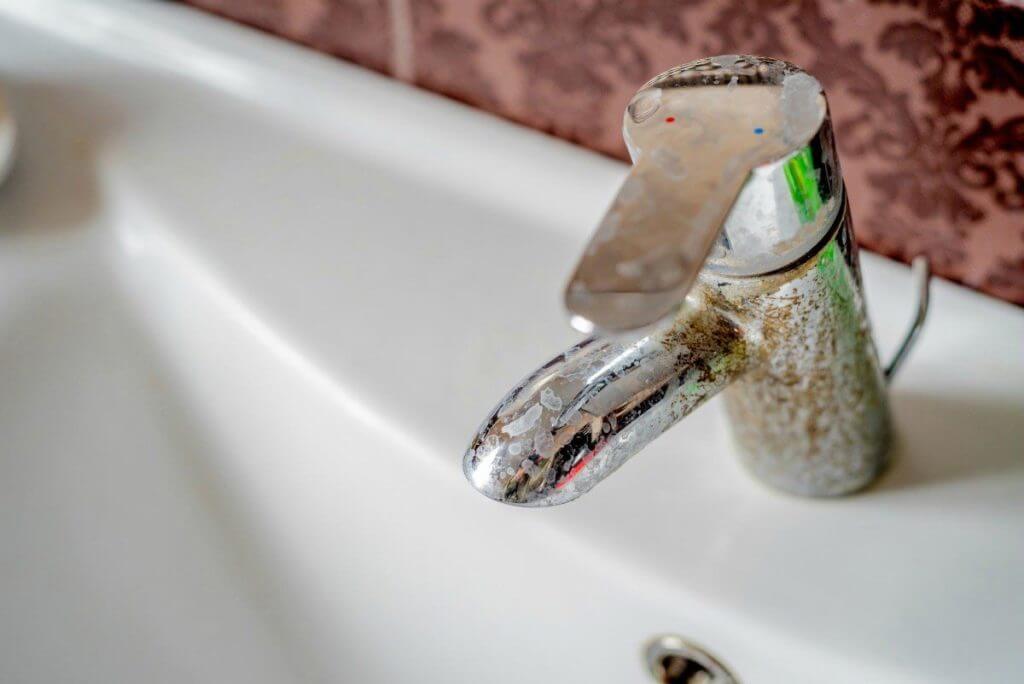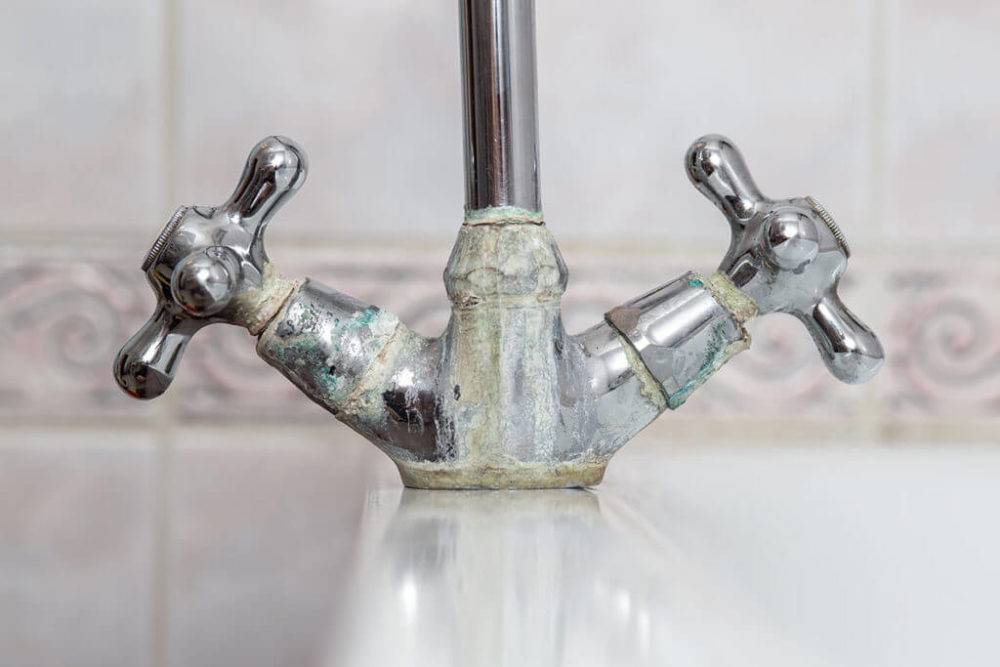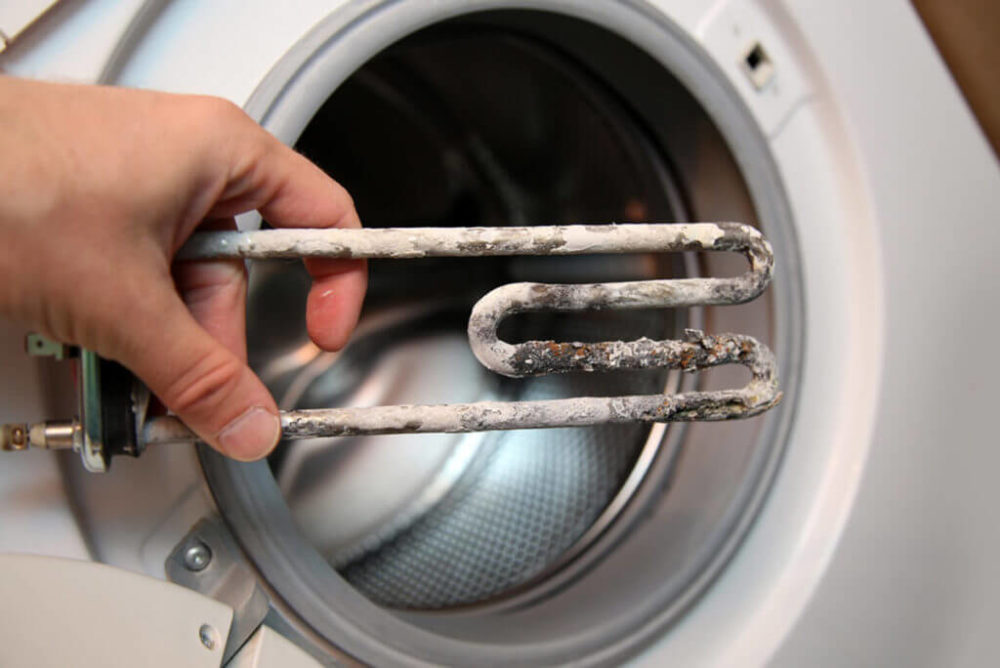Hard Water Buildup Problems and Solutions
What is Hard Water?
Water is considered “hard” if it has a high concentration of dissolved minerals like magnesium and calcium. It can cause:
- White calcium buildup on faucets and fixtures
- Reduced water flow through appliances and faucets
- Residue on dishes out of the dishwasher
- Dry skin and hair
Calcium and magnesium can be picked up by groundwater as it passes in and around soil and rocks. Water hardness is measured in grains per gallon (GPG), parts per million (ppm) or milligrams per liter (mg/L). The Water Quality Association considers water to be hard if it has more than 17.1 ppm or 1 GPG. According to a U.S. Geological Survey, 85% of the water in the United States is considered hard water.
Signs of Hard Water
If your home has hard water, you’ll notice mineral deposits, stains or a white film on surfaces like porcelain, enamel, china, stainless steel, tile, chrome, fiberglass, and glass. You may notice stains or build-up on bathroom fixtures, dishes, and sinks.
In addition to magnesium and calcium, manganese, brass, iron or copper can also be present in the water. Manganese stains look brownish or black, while iron-rich water leaves deposits that look red or like white slime. If you notice blue or green stains around your plumbing fixtures, your water may be slightly acidic, which can erode brass or copper pipes.

Problems Caused by Hard Water
While hard water doesn’t pose a health risk, the buildup of mineral deposits it leaves behind can reduce efficiency of water pipes and water heaters, and also make soap and detergents less effective.
Clothes look dingy and wear out fast
Washing clothes in hard water can make them look dingy, feel scratchy, and actually damage the fibers. According to hardwater.org, it can even shorten the life of your clothes by as much as 40%.
Clogged showerheads
Mineral deposits from hard water canbuild up around the openings in your shower head, causing clogs that reduce the water pressure of your shower.
Soap scum or “soap curd” on tubs, showers and other surfaces
Hard water prevents soap from cleaning and dissolving completely. Instead, the soap bonds with the minerals in the water to form a film or “curd” that sticks to everything and causes a soap scum ring in the bath tub.
Cleaning is more difficult
The hard deposits left behind after hard water dries are called lime scales. These minerals are difficult to remove, and can even cause chemical reactions that make cleaning products less effective.
Permanent damage to glass shower doors
In some cases, mineral deposits can become so bad that there is a chemical change that permanently damages the material. For example, if you have a glass shower door with a white, cloudy residue that never seems to come off completely, those stains may be permanent because the chemicals have etched the glass.
Damage to plumbing fixtures
Plated plumbing fixtures that are discolored from mineral buildup are often beyond restoration, because the chemicals eat through the coating. You may see mineral build-up around drains, faucets, and on shower heads. These deposits can damage the rubber washers that seal the fixtures, creating leaks that can cause even more damage.
Damage to appliances
Appliances that use water, like coffee makers, washing machines, ice makers and dishwashers, can have lime scale build up around the valves and seals, which leads to water leaks.
Spots and streaks on dishes and glasses
Washing glasses and dishes in hard water can cause spots, streaks, and a cloudy film to develop. Although they don’t post a health risk, they can be difficult to remove and can make your dishes look like they’re not clean.
Dull, lifeless hair
Washing your hair in hard water can cause build-up that makes it tangle easily, look dull and feel rough.
Skin irritation and film
Showering or bathing in hard water with soap can leave a film on your skin, which can prevent the removal of dirt and bacteria. This film can also irritate skin.
Clogged water pipes
Lime scale, made up of magnesium and calcium deposits, can build up in your plumbing system and reduce the flow of water through the pipes. PVC and copper pipes are not as susceptible to this problem, but it is a big issue for steel pipes. Over time, your home’s water pressure will be lower, and as the water flow slows down the buildup of lime scale will speed up until eventually your water pipes are completely clogged. Once they become completely blocked, your pipes will have to be replaced.
Increased water heater energy consumption
Lime scale can build up inside your water heater, reducing its efficiency and life span. The mineral deposits on the heating element can make it take longer to heat water, which means your water heater will have to work longer. Lime scale buildup from hard water can also reduce your water heater’s life span by 25 – 40%, according to a study by the U.S. Department of Energy.

How to clean and remove hard water mineral deposits and stains
It’s best to clean hard water stains regularly, before they have a chance to penetrate the surface. Lemon juice, vinegar, baking soda, and even white wine are effective nontoxic, natural cleaners that can remove stains and lime scale in your home. Of course, there are also many chemical products that work, too. Here are a few cleaning methods for hard water stains:
Chrome faucets – Wrap paper towels or a rag soaked in vinegar around the faucet and let it sit for an hour. Then, rinse with water and wipe it dry.
Showerhead – Take off the shower head and soak it in white vinegar overnight, or at least for several hours. Then, scrub it with an old toothbrush, rinse with water and reinstall it.
Shower doors – Spray shower doors with white vinegar or white wine to remove lime scale and hard water stains from the glass.
Dishwasher – Once a month, add a cup of white vinegar to your dishwasher and run it through a cleaning cycle without any dishes in it.
Washing machine – Add a gallon of white vinegar to the washing machine and run the empty washer through a wash cycle with hot water.
Rubber bath mat – To clean and disinfect a rubber bath mat, soak the mat for an hour in a bucket or tub with enough white vinegar to cover it. Then, scrub with a brush and rinse with warm water.
Toilet tank and bowl – Adding 3 cups of white vinegar to your toilet tank will get rid of hard water stains inside. To clean the bowl, add 3 cups of vinegar and scrub.
Coffee maker – Run one brewing cycle with the water reservoir full of white vinegar to remove mineral deposits. Then, run two more brewing cycles with plain water to rinse the coffee maker.
Sinks and tubs – Spray surfaces with lemon juice or vinegar, let sit for half an hour, and then wipe clean. Depending on how much soap scum build up there is, multiple applications may be necessary.
Cleaners for different hard water stains:
- Red, reddish brown (from rust or iron) – Paste of cream of tartar and water; let dry, then rinse
- Green, blue-green stains (from copper or acid water) – Soap suds and ammonia, then rinse
- Brown, black or others (from manganese and other minerals) – Paste made of cream of tartar and hydrogen peroxide; let stand, then rinse
- Hard-water marks, soap scum – Paste made of white vinegar and baking soda; let stand, then rinse
Chemical cleaning products for removing limescale and hard water stains
If you choose to use a commercial tub, sink and tile cleaner to remove mineral build up, choose one that contains “sequestrants” like phosphoric, hydrochloric, or hydroxyacetic acids, which capture and deactivate the minerals in water. Be cautious with abrasive cleansers, because they can scratch the surface of your plumbing fixtures, sinks and tubs, making hard water deposits build up even faster. All-purpose cleaners can be effective for regular cleaning and removing hard water deposits and soap scum. Follow all manufacturer’s instructions for proper use of the cleaners. Many of these products have strong fumes, so be sure to use adequate ventilation.

How to prevent hard water stains and mineral deposits
Prevention is really the key to getting rid of mineral deposits, stains, and lime scale buildup from hard water.
Don’t let water dry on surfaces
The mineral deposits from hard water are what’s left behind when the water evaporates, so wiping surfaces dry is key to preventing stains. On glass shower doors, use a rubber squeegee to remove water after each shower.
Use a spray cleaner on shower doors
If you don’t want to squeegee your shower doors, spray them with a shower cleaner after each use to help prevent hard water stains. Some people also apply Rain-X to glass shower doors to help prevent water from drying on the surface.
Install water softening equipment
This method requires the least amount of effort on your part, because a water softener removes the stain-causing minerals at the source, before your water is distributed throughout your plumbing system.
Electromagnetic Solution
There are new systems that can attached to your plumbing to reduce hard water. Flow-Tech has a product that uses a low-frequency signal that is pulsed into your plumbing system. The electromagnetic signal reverses the charge of the minerals that are in the water. This non-invasive method has mixed reviews, depending on the exact mineral levels in your water.
We do our best to provide current and accurate information, but this content could contain errors or information that is not correct for your situation or equipment. Resources found on our website are provided as general information. Reddi Industries does not assume any liability resulting from the provided information. If you attempt to repair or modify plumbing, electrical, or other equipment in your home or business, always consult your equipment’s operating manual first, and only do so if you are qualified.
